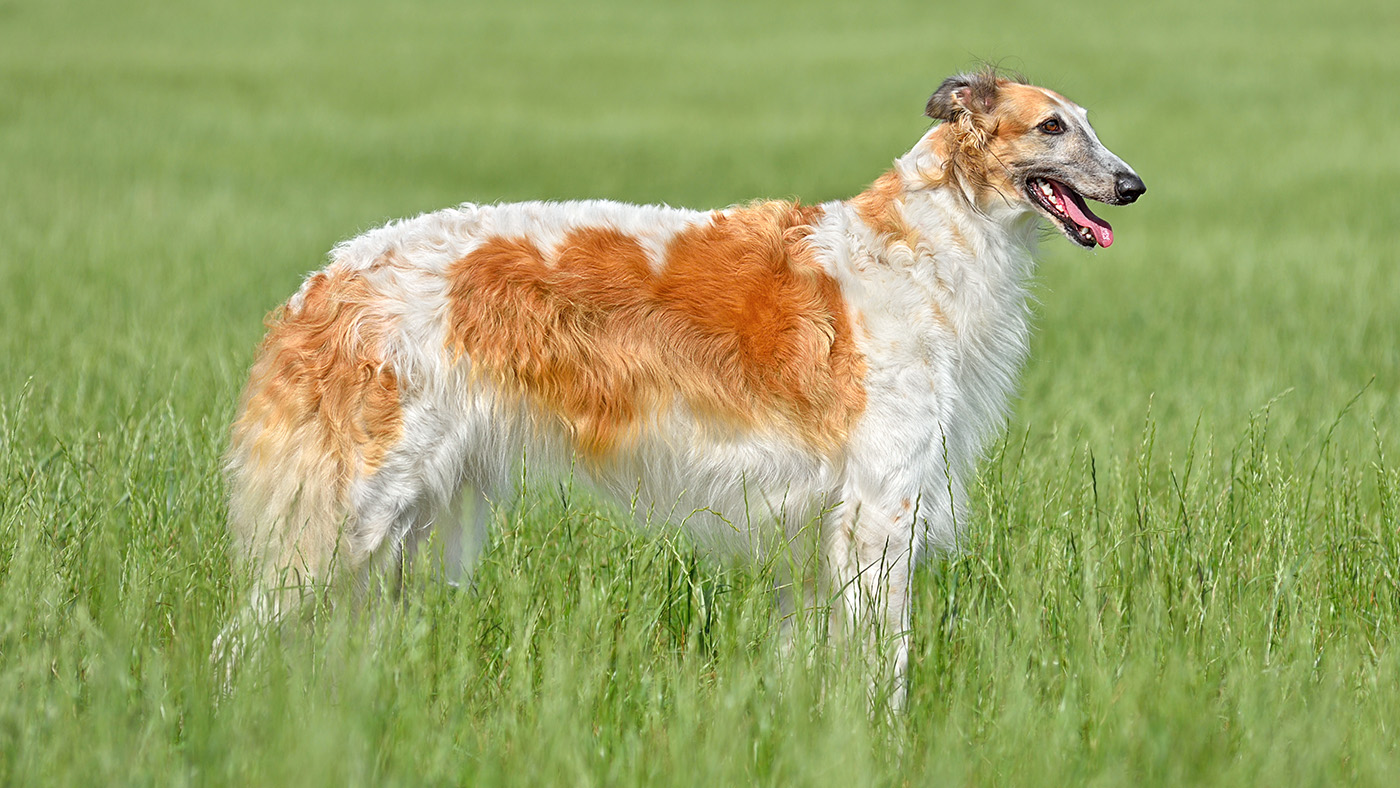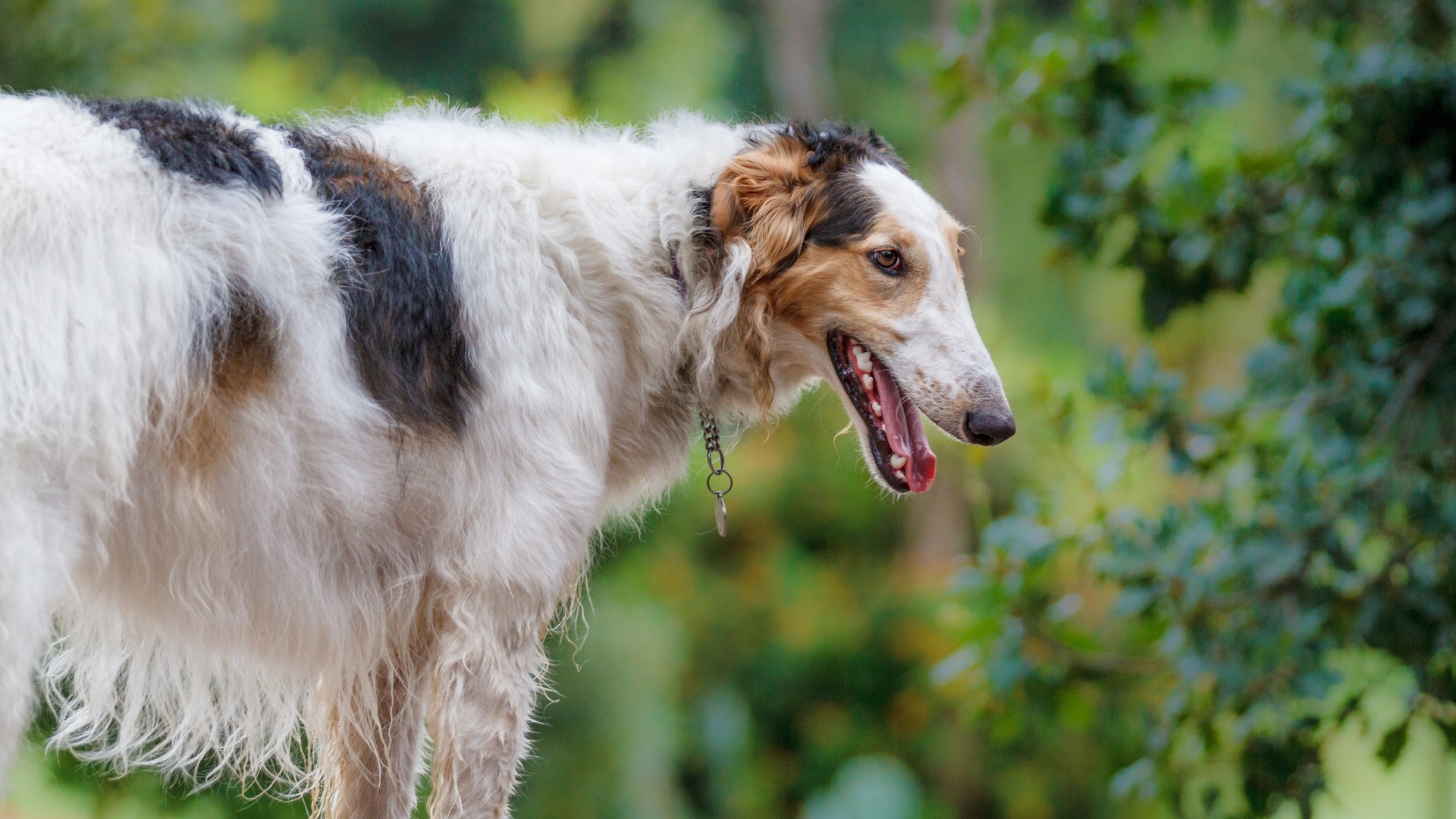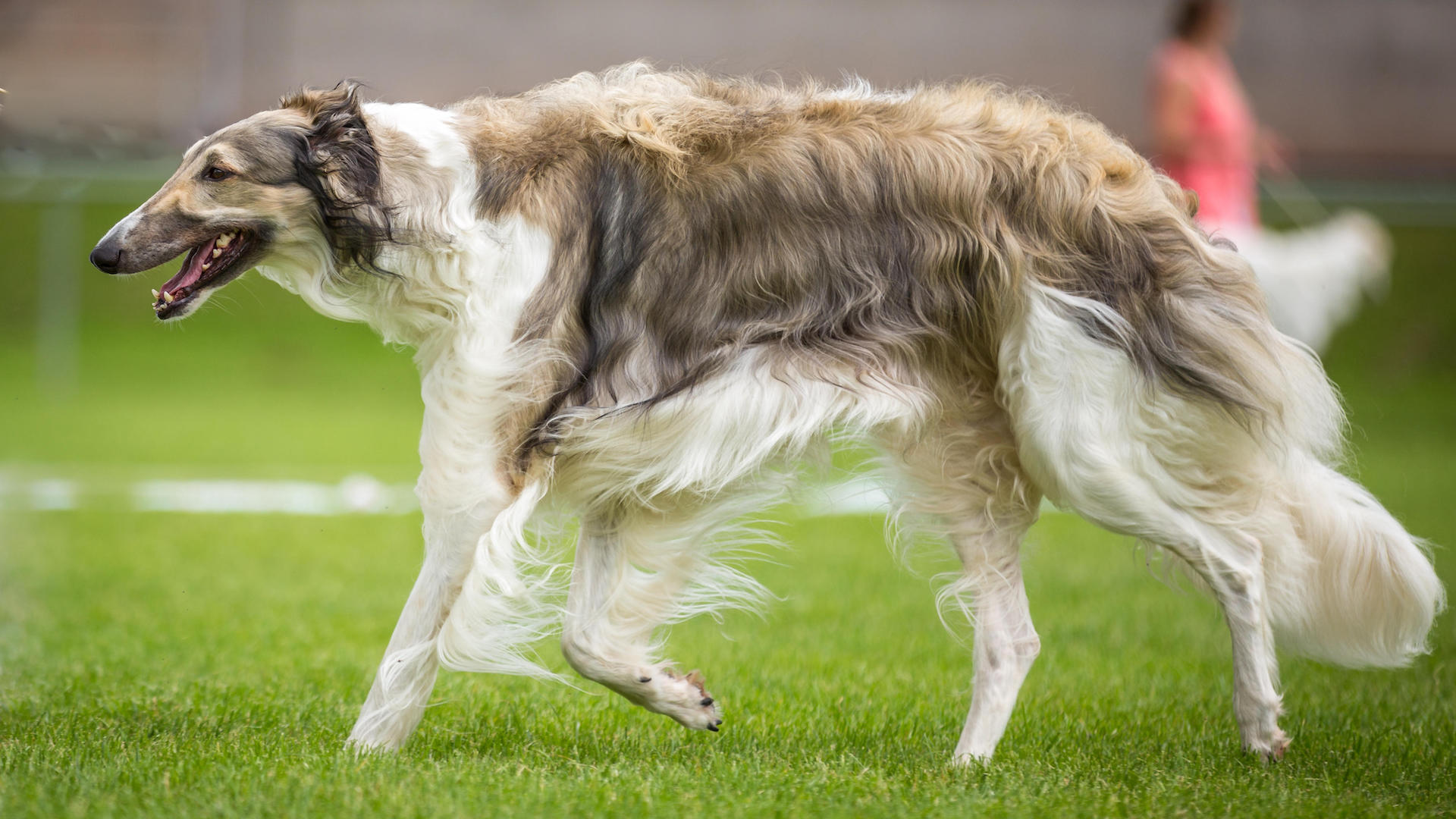

Life expectancy: 12 years years
Size: 28-inches (male); 28-inches (female)
Coat: Silky, long and flat, wavy or slightly curvy
Temperament: Athletic, gentle, independent, quiet
Exercise needs: About an hour daily
Origin/native country: Russia
Also known as the Russian Wolfhound and easily identified thanks to their distinctively shaped head, borzois are agile sighthounds capable of forming very close bonds with their owners.
Originally bred for wolf hunting in Russia in the 17th century, they have also assisted with hunting foxes, hares and boars but now they’re happier as calm, gentle companions – even though they can, at times, be something of a handful.
In this guide, we’ll learn just why they can be difficult to manage. We’ll also discover why they can make wonderful pets, particularly if you live in an active household. Helping us with expert advice is vet Dr Rebecca MacMillan who also explains some of the key health concerns.
Does a borzoi need a lot of exercise?
Given their greyhound ancestry, Borzois are one of those dog breeds that were made for running and, as one of the fastest dog breeds, they’re capable of reaching speeds of up to 35mph.
The good news, however, is that they like to run in bursts and exercise for relatively short periods so while you will need to ensure a Borzoi is taken for a daily long walk or run, the time you’ll need to spend doing so isn’t excessive.
“Borzois are an active breed that need around an hour of exercise each day, depending on their age and health status,” says Dr MacMillan.
Ideally, you’d split the session into two and built in some time for this breed to explore. That will help to keep their mind stimulated and prevent boredom setting in.
Do be wary of your surroundings, however.
“These dogs are sighthounds so they have keen vision and they are very speedy,” Dr MacMillan adds. It means you need to consider the possibility that this breed will suddenly spot a small animal and try to make a dash for it.
Ideally, you will also have a large, secure and safe place of your own whether that’s a yard or a patch of land you’re allowed to use.
“Borzoi need plenty of space to be able to run off the leash freely,” Dr MacMillan explains.
Are borzois easy to train?
The main issue you will encounter when exercising a borzoi is the same problem you will face when training this breed.
“Their high prey drive can make recall training tricky so it’s essential to walk them somewhere secure,” says Dr MacMillan.
Training is made doubly difficult due to a Borzoi’s temperament.
“They are intelligent but independent, which may make training tricky for a novice,” Dr MacMillan adds. Due to that, some experts have suggested you don’t set a specific time to train a borzoi but use positive reinforcement throughout their early years to steer them in the right direction.
Early socialization is important because you need to get this breed used to being around people and animals. You also need to keep a tight hold of a Borzoi when you’re out and about in a non-secure area even when it’s trained because you’ll never quite know what it may get up to if you let go.
Why is a borzoi’s snout so long?
This is a commonly asked question about this breed but there’s a simple enough explanation.
“Borzois were originally bred as hunting dogs. Their long noses are thought to enhance their sense of smell, as well as allowing smooth airflow into the lungs while exercising,” Dr MacMillan says. “Their long snout also helps to make them very streamlined, which is essential when you are dog built for speed.”

Do borzois make good family pets?
Since borzois have a strong prey drive and an independent streak, you can be forgiven for thinking this breed could be aggressive. With good training and early socialization, however, you shouldn’t have any issues.
Indeed, as Dr MacMillan says: “Borzois are affectionate, gentle and quiet. They have an elegant temperament to match their elegant looks!”
You will find that, aside from being one of the quietest dog breeds, they really enjoy making use of the best dog toys.
“Although these dogs are known for their calm demeanour, they do enjoy periods of play,” Dr MacMillan explains.
For all of these reasons, borzois do make great family pets.
“Care needs to be taken with small children however, as the borzois' large size and their speed could be intimidating,” Dr MacMillan says.
Do borzois need a lot of grooming?
You can instantly see that the Borzoi has a silky long, thick insulating coat making it a longhaired dog breed worthy of a shampoo commercial. And that’s what you’re going to have to do from time to time – get busy in the bath to ensure this breed is nice and clean. Unless, that is, you have them professionally groomed which is what most experts will recommend.
Other than that, you simply need to grab one of the best dog brushes to tackle the fur.
“Borzois will need brushing a couple of times a week to keep their long, silky coat in good condition, " Dr MacMillan affirms. You may also want one of the best vacuum cleaners for pet hair.
Borzois shed moderate amounts all year round but, like many breeds, they experience a heavy shedding period twice a year,” Dr MacMillan says. “This is definitely not a hypoallergenic breed!”
Common health problems in borzois
Borzois are sadly prone to many health issues some of which could affect their lifespan.
“Dilated cardiomyopathy is one example,” Dr MacMillan says. “This causes the muscular heart walls to become progressively weak and thin. The heart reaches a point where it is no longer able to beat effectively, leading to heart failure.”
Like many pedigree dogs, the Borzoi can suffer from inherited joint issues such as hip dysplasia.
“This can lead to painful lameness, mobility issues, and early-onset arthritis,” Dr MacMillan explains.
Unfortunately there’s more.
“Borzois are also prone to cancer including lymphoma and osteosarcoma [bone cancer],” she adds. “Being a large, deep-chested dog, gastric dilatation volvulus is a concern for this breed as well. Bloating of the stomach occurs, followed by it twisting on itself. This can be fatal without immediate veterinary attention.”
Should I get a borzoi?
Borzois are not ideal if you’re a first time dog owner. You may find training a struggle and be overwhelmed by their athletic nature. If you don’t have the space to allow them to safely run off leash, you’re also doing this breed a disservice, likewise if you live in a small home.
But if you are experienced, have an older family and live in a large home with a big secure yard, you should certainly have a borzoi on your list. They’re affectionate, elegant and loving – they adore snuggling up to their favorite humans. It’s a real shame they have so many health issues.
Want to learn more about dogs? Here are some of expert behaviorist Helen Master’s favorite dog facts
Edited by Georgia Guerin.







